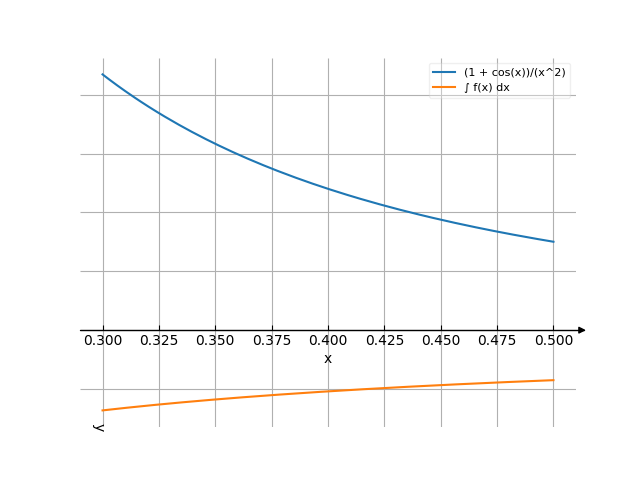Integral of (1+cos(x))/x^2 dx
The solution
You have entered
[src]
1/2 / | | 1 + cos(x) | ---------- dx | 2 | x | / 3/10
$$\int\limits_{\frac{3}{10}}^{\frac{1}{2}} \frac{\cos{\left(x \right)} + 1}{x^{2}}\, dx$$
Integral((1 + cos(x))/(x^2), (x, 3/10, 1/2))
Detail solution
-
Rewrite the integrand:
-
Integrate term-by-term:
-
Don't know the steps in finding this integral.
But the integral is
-
The integral of is when :
The result is:
-
-
Now simplify:
-
Add the constant of integration:
The answer is:
The answer (Indefinite)
[src]
/ | | 1 + cos(x) 1 cos(x) | ---------- dx = C - - - Si(x) - ------ | 2 x x | x | /
$$-{{1}\over{x}}-{{i\,\Gamma\left(-1 , i\,x\right)-i\,\Gamma\left(-1
, -i\,x\right)}\over{2}}$$
The graph
The answer
[src]
4 10*cos(3/10) - - Si(1/2) - 2*cos(1/2) + ------------ + Si(3/10) 3 3
$$-{{3\,i\,\Gamma\left(-1 , {{i}\over{2}}\right)-3\,i\,\Gamma\left(-1
, {{3\,i}\over{10}}\right)+3\,i\,\Gamma\left(-1 , -{{3\,i}\over{10
}}\right)-3\,i\,\Gamma\left(-1 , -{{i}\over{2}}\right)-8}\over{6}}$$
=
=
4 10*cos(3/10) - - Si(1/2) - 2*cos(1/2) + ------------ + Si(3/10) 3 3
$$- 2 \cos{\left(\frac{1}{2} \right)} - \operatorname{Si}{\left(\frac{1}{2} \right)} + \operatorname{Si}{\left(\frac{3}{10} \right)} + \frac{4}{3} + \frac{10 \cos{\left(\frac{3}{10} \right)}}{3}$$
The graph

Use the examples entering the upper and lower limits of integration.

![Find the integral of y = f(x) = (1+cos(x))/x² dx ((1 plus co sinus of e of (x)) divide by x squared) - with detailed solution [THERE'S THE ANSWER!] (1+cos(x))/x^2](/media/krcore-image-pods/176/hash/indefinite/f/8c/29cb93f0441608628d0e6166e8fed.png)
 Integral of (x^2+1)/((x^3+3x+1)^5)
Integral of (x^2+1)/((x^3+3x+1)^5)
 Integral of (x-1)^1/2
Integral of (x-1)^1/2
 (1+cos(x))/x^2
(1+cos(x))/x^2